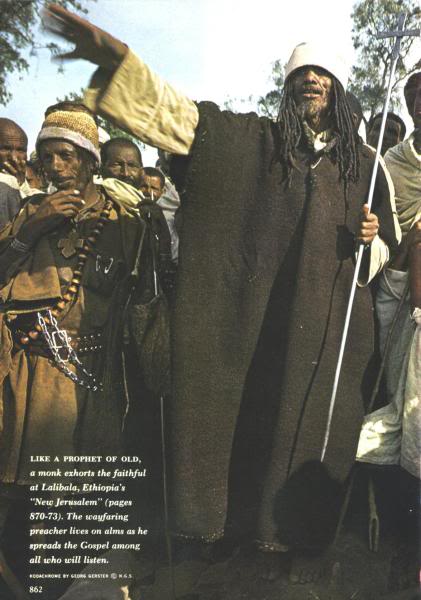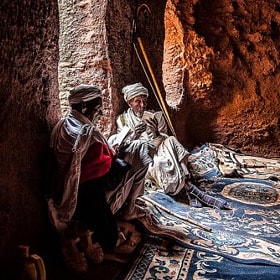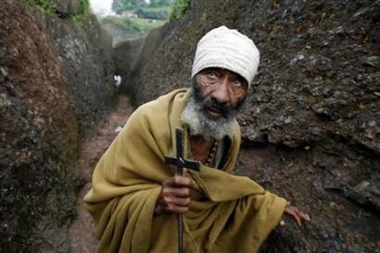In Focus: The Lalibela Churches
......
Blessed are those who dwell in your house;
they are ever praising you.[a]
5 Blessed are those whose strength is in you,
whose hearts are set on pilgrimage.
6 As they pass through the Valley of Baka,
they make it a place of springs;
the autumn rains also cover it with pools.
7 They go from strength to strength,
till each appears before God in Zion.
8 Hear my prayer, Lord God Almighty;
listen to me, God of Jacob.
9 Look on our shield,[c] O God;
look with favor on your anointed one.
10 Better is one day in your courts
than a thousand elsewhere;
I would rather be a doorkeeper in the house of my God
than dwell in the tents of the wicked.
Psalm 84 is a “psalm of pilgrimage”. Every year crowds would flock to Jerusalem for the Feast of Tabernacles and they would make the journey from every part of the territories occupied by Israel. They would make their pilgrimage to the Holy City to worship at the Temple. The Hebrews were required to go to Jerusalem three times each year to celebrate Passover, Pentecost and Feast of Tabernacle. But for the psalmist, he was either on his way or he is unable to go to Jerusalem. This Psalm expresses the yearnings and the prayers of a pilgrim approaching the dwelling place of God in Jerusalem. ..as his entire being yearns for the courts of God; his soul, his heart and his flesh "cry out for the living God."
The pilgrimage to the temple passed through the barren Valley of Baca. No specific valley has been identified with Baca (even though suggestions have been made)....but because Baca can mean "weeping," it may have been a symbolic reference to the times of struggles and tears through which people must pass on their way to meet God. Something I remember learning years ago was that growing strong in God's presence is often preceded by a journey through barren places in our lives....and the person who loves to spend time with God will see his or her adversity as an opportunity to re-experience God's faithfulness.
And thank goodness that the Lord has not called us on pilgrimage alone - as there are many others whose hearts the Lord has worked on to desire to be in His House and with HIS People ..together in journeying with Him. For believers, what happens in their fellowships is a microcosm of what the Lord does around the world - for He knits others together who help each other walk together after the Lord. And it has really been on my mind that what we do is a big way of helping others on that journey.
Others may be going through all Hell in their lives and feeling like giving up - but in serving, we're in the position to help them see why they should not give up on the journey the Lord has called them to in Him. In every act of service, from offering words of encouragement when they bring things up to sharing our own hearts in what the Lord has shown us in our struggles/what we learn in Holy Scripture to simply praying for them as we seek to serve them in love like Jesus did with his own disciples (
John 13).
With pilgrims, something I got to find out recently was that the roads leading towards Zion were dangerous - with others having to often travel in groups/caravans in order to be protected. And when it came to traveling the roads they were on/going up to a festival: the pilgrim-high-roads with their separate halting-places (stations) were constantly present to the mind of such persons. The stations other pilgrims stopped on were just as important as the destination itself - and pilgrims traversed joyfully the road to the great assembly, .....finding refreshment even in the dreariest part of the road.
For around things like a well men meet and converse cheerfully, being refreshed after their journey (just like a marathon where they have rest points for others to drink water and be encouraged further), so even in tears, or any other dreary part, the pilgrims find solace in brotherly communion and in anticipation of the general assembly that is to come with its joys unspeakable.
And in many ways, what happens with believers in action during meeting is a matter of being a "stopping station" for other pilgrims to rest up and know how to get to where they need to be.
In serving , we get to be like tour-guides who help them see what Heaven is going to be like when it comes to the overwhelming love of the Lord and believers serving each other - and in that process, we help take them alongside us to the Lord....seeking him and looking forward to what we'll have in Him one day.
And in having excitement whenever we serve, it's cool since it's just one more way for us to bring others to the Lord's place...
1 I rejoiced with those who said to me,
“Let us go to the house of the Lord.”
2 Our feet are standing
in your gates, Jerusalem.
3 Jerusalem is built like a city
that is closely compacted together.
4 That is where the tribes go up—
the tribes of the Lord—
to praise the name of the Lord
according to the statute given to Israel.
5 There stand the thrones for judgment,
the thrones of the house of David.
I hope what I shared was encouraging in some kind of way. Seeing what happens with the people in the Rock Churches of Ethiopia and how they (including the Ethiopian Monks as well as the women seeking the Lord actively) journey in the natural, I so appreciate how they have sought to emulate what happens in the spiritual in a very physical way. ....and it really has me processing.
Extraordinary architecture. I'd love to visit those sites one day. Bucket list!



















 ..and prayerfully, I'll be able to visit the
..and prayerfully, I'll be able to visit the 



